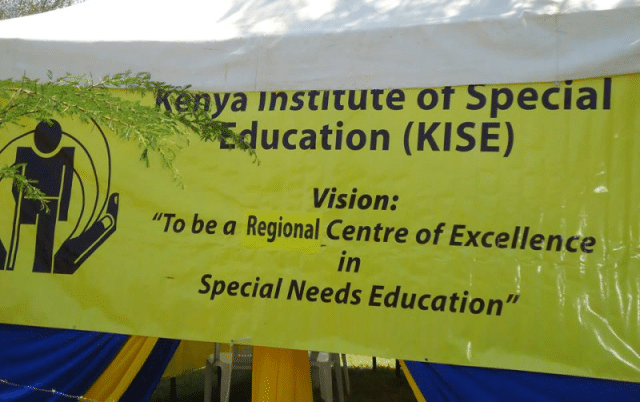KISE Set To Open Region Branches Countrywide
The Ministry of Education is set to elevate the Kenya Institute of Special Education (KISE) to make it a Semi-Autonomous Government Agency status.
The Presidential Working Group on Education Reform was given the responsibility of reviewing the Competency-Based Curriculum (CBC) and made the following recommendations.
Dr Julius Jwan the Principal Secretary to the State Department for Early Learning and Basic Education said that if KISE is updated, it will be able to open regional branches across the country and bring its services closes to the people.
“The government has already released money for purchasing specialized equipment for the institute,” said PS Julius Jwan. He also gave assurances that there will be continued support for the work done at the facility.
Jwan revealed that since learners with special needs must be handled with care, schools have been directed to implement structures that can accommodate them.
“The Ministry has conducted assessments on what learners need. We have been providing capitation for every learner of which those with special needs receive more than those in regular schools,” added PS Jwan.
The PS had attended the fourth KISE Conference held in Nairobi on behalf of the Cabinet Secretary for Education Ezekiel Machogu. The conference was titled “Parental Empowerment and Engagement in Nurturing Children with Potential Disabilities”.
The conference’s participants came from Kenya, Mauritius, Nigeria, Somalia and the United Kingdom and were held for two days.
The conference was intended to give parents a chance to discuss how they care for their children during the day and night so that specialists can offer advice.
Among those attending the event was Ms Sylvia Mochabo, the founder of Andy Speaks 4 Special Persons Africa and Board Director at the National Council of Persons with Disabilities said that the parents of autistic children love the CBC because it allows children to discover their full potential.
She added that for children with disabilities to benefit from policies, development initiatives, health and education, the government has to guarantee coordination between the Ministries of Education and Health.
According to Mochabo, the government should examine solutions that will benefit special needs parents who act as caregivers for their disabled children, saying that the current regulations require that the beneficiaries be the affected children, despite some being confined to wheelchairs and others having blindness, autism and other forms of disability.
“These children are 100 per cent dependent on their parents with impairments to enrol them in special schools instead of hiding them.
On her part, Dr Norman Kiogora who is the Director of KISE, implored parents of children with impairments to enrol them in special schools instead of hiding them.
Kiogora said that children with disabilities need assistance, someone who believes in them and encouragement so that they never give up.



Comments are closed.